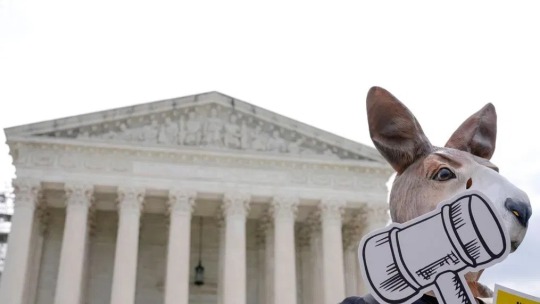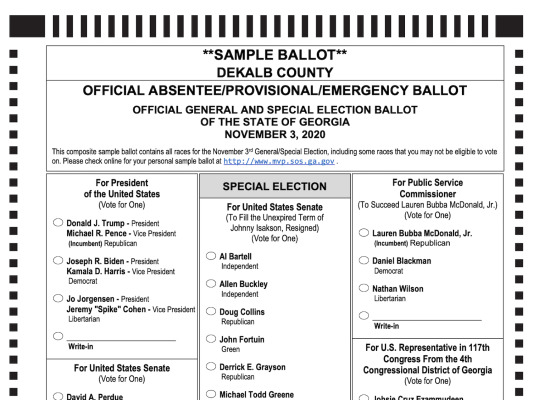#Judge Michael Luttig
Text
When Annie Asks ...
Almost everyone has had something to say about the Supreme Court and the case to decide whether Trump should have full immunity from consequences for his crimes in inciting an attempted coup on 06 January 2021. Although the Court has not ruled yet, nor likely will before late June, certain Justices gave the impression while hearing the evidence that they will likely grant Trump’s three wishes,…

View On WordPress
0 notes
Link
An influential group of Republican legal voices called for a Jan. 2024 trial date to be set for Donald Trump for his attempt to overturn the presidential election. The group included former Attorney General Alberto Gonzales and Michael Luttig, a retired federal judge and one of the nation's leading conservative legal minds. Judy Woodruff spoke with Luttig for her series, America at a Crossroads.
0 notes
Link
READ MORE https://heathercoxrichardson.substack.com/p/june-16-2022/comments
0 notes
Text
Conservative Judge J. Michael Luttig's Testimony
Conservative Judge J. Michael Luttig’s Testimony
Anna MoneymakerGetty Images
Oddly, the most eloquent moment in Thursday’s hearing before the House Select Committee investigating the events of January 6, 2021 came before anyone sat down before a microphone. Prior to the opening of the hearing, retired conservative federal judge J. Michael Luttig, a man who’s at least twice come within an ace of the Supreme Court, released his opening statement…

View On WordPress
0 notes
Quote
Retired conservative Judge J. Michael Luttig, who advised Mike Pence on the eve of Jan. 6 that he had no power to play functionary in Trump’s coup, declared this week that the GOP is no longer a political party able to function in a democracy. Trump took and maintains control of the GOP for precisely this reason. He embodies the one principle left in the GOP: Power is only legitimate when it’s wielded by Republicans.
The GOP Is Done with Democracy
1K notes
·
View notes
Text

Judge Michael Luttig on Trump's immunity claim
61 notes
·
View notes
Text
Quote of the Day
This is a momentous decision, just to hear this case. There was no reason in this world for the Supreme Court to take this case. Under the constitutional laws of the United States, there has never been an argument that a former president is immune from prosecution for crimes that he committed while in office.
Judge Michael Luttig (ret.)
(Judge Luttig is an icon of the conservative judicial world)
66 notes
·
View notes
Text
By Joseph Ferguson & Thomas A. Durkin, Loyola University Chicago
After three indictments of former President Donald Trump, the fourth one in Georgia came not as a surprise but as a powerful exposition of the scope of Trump’s efforts to remain in power despite losing the 2020 presidential election.
New conservative legal scholarship spells out how and why those actions – which were observed by the public over many months – disqualify Trump from serving in the presidency ever again. And our read of the Georgia indictment, as longtime lawyers ourselves, shows why and how that disqualification can be put into effect.
The key to all of this is the 14th Amendment to the Constitution, which states that “No person shall … hold any office, under the United States … who, having previously taken an oath … to support the Constitution of the United States, shall have engaged in insurrection or rebellion against the same, or given aid or comfort to the enemies thereof.” Trump took that oath at his inauguration on Jan. 20, 2017.
Both Trump’s Georgia indictment, and his federal indictment in Washington, D.C., cite largely public information – and some newly unearthed material – to spell out exactly how he engaged in efforts to rebel against the Constitution, and sought and gave aid and comfort to others who also did so.
Legal scholars William Baude and Michael Stokes Paulsen, conservatives themselves and members of the conservative Federalist Society, have recently published a paper declaring that under the 14th Amendment, Trump’s actions render him ineligible to hold office.
We believe the Georgia indictment provides even more detail than the earlier federal one about how Trump’s actions have already disqualified him from office, and shows a way to keep him off the ballot in 2024.
DISQUALIFICATION IS AUTOMATIC
Trump’s supporters might argue that disqualifying him would be unfair without a trial and conviction on the Jan. 6 indictment, and perhaps the Georgia charges.
But Baude and Paulsen, using originalist interpretation – the interpretive theory of choice of the powerful Federalist Society and Trump’s conservative court appointees, which gives full meaning to the actual, original text of the Constitution – demonstrate that no legal proceeding is required. They say disqualification is automatic, or what’s known in the legal world as “self-executing.”
Recent public comments from liberal constitutional scholar Laurence Tribe and conservative jurist and former federal Judge Michael Luttig – who has characterized the events before, during and since Jan. 6 as Trump’s “declared war on American democracy” – suggest an emerging bipartisan consensus supporting Baude and Paulsen.
BACKED BY HISTORY
This is not a theoretical bit of technical law. This provision of the 14th Amendment was, in fact, extensively used after the Civil War to keep former Confederate leaders from serving in the federal government, without being tried or convicted of any crime.
Few former Confederates were charged with crimes associated with secession, rebellion and open war against the United States. And most were pardoned by sweeping orders issued by President Andrew Johnson.
But even though they had no relevant convictions, former Confederates were in fact barred from office in the U.S.
In December 1865, several who had neither been convicted nor been pardoned tried to claim seats in the U.S. House of Representatives. But the House clerk refused to swear them in. It took an act of Congress – the 1872 Amnesty Act – to later restore their office-holding rights.
There is no requirement in the Constitution that the disqualification be imposed by any specific process – only that it applies to people who take certain actions against the Constitution.
A PATH THROUGH THE STATES
For the U.S. in 2023, we believe the most realistic avenue to enforce the 14th Amendment’s ban on a second Trump presidency is through state election authorities. That’s where the Georgia indictment comes in.
State election officials could themselves, or in response to a petition of a citizen of that state, refuse Trump a place on the 2024 ballot because of the automatic 14th Amendment disqualification.
Trump would certainly challenge the move in federal court. But the recent disqualification proceedings against former North Carolina Congressman Madison Cawthorn provides a road map and binding legal precedent affirming the 14th Amendment as a valid legal ground for disqualification of a candidate for federal office.
The Georgia indictment against Trump and allies exhaustively details extensive acts of lying, manipulation and threats against Georgia officials, as well as a fraudulent fake elector scheme to illegally subvert the legitimate 2020 Georgia presidential vote tally and resulting elector certification.
Trump’s failure to accomplish what is tantamount to a coup in Georgia and other swing states set the stage for the violent insurrection of Jan. 6, 2021, that sought to achieve the same result – Trump’s fraudulent installation to a second term.

In fact, the Georgia scheme is included in Special Counsel Jack Smith’s federal indictment as one of the methods and means in “aid” of the larger Jan. 6 federal conspiracy against the United States.
Baude and Paulsen acknowledge that “insurrection and rebellion” are traditionally associated with forced or violent opposition. But we see the broader set of actions by Trump and his allies to subvert the Constitution – the Georgia vote count and fake elector scheme included – as part of a political coup d'etat. It was a rebellion.
GEORGIA AS A BELLWETHER
So what makes the Georgia scheme and indictment compelling for purposes of disqualifying Trump from the 2024 Georgia ballot?
There are minimally six aspects revealed in the latest indictment that we believe justify Georgia – under Section 3 of the post-Civil War Fourteenth Amendment – keeping Trump off the ballot:
1. The racketeering scheme was a multifaceted attempt to subvert Georgia’s own part of the 2020 electoral process;
2. The officials on the receiving end of the unsuccessful racketeering scheme were elected and appointed Georgia officials. …
3. … whose actions to reject election subversion vindicated their own oaths to uphold the Constitution and laws of the United States as well as Georgia’s;
4. Most of these officials were and are Republicans – including Secretary of State Brad Raffensberger, Governor Brian Kemp and former Lt. Governor Geoff Duncan;
5. These officials will, in 2024 as in 2020, collectively determine who is qualified to be on Georgia’s presidential ballot; and
6. These officials’ testimony, and related evidence, is at the heart of the proof of the Georgia racketeering case against Trump.
In other words, the evidence to convict Trump in the Georgia racketeering case is the same evidence, coming from the same Georgia officials, who will be involved in determining whether, under the 14th Amendment, Trump is qualified to be on the 2024 presidential ballot – or not.
Little if any additional evidence or proceedings are needed. The Georgia officials already hold that evidence, because much of it comes from them. They don’t need a trial to establish what they already know.
How could Trump avoid this happening? A quick trial date in Atlanta with an acquittal on all counts might do it, but this runs counter to his strategy to delay all the pending criminal cases until after the 2024 election.
With no preelection trial, there will likely be no Trump on the 2024 Georgia ballot, and no chance for him to win Georgia’s 2024 electoral college votes.
Once Georgia bars him, other states may follow. That would leave Trump with no way to credibly appear on the ballot in all 50 states, giving him no chance to win the electoral votes required to claim the White House.
#us politics#news#the conversation#Joseph Ferguson#Thomas A. Durkin#op eds#republicans#donald trump#conservatives#trump administration#georgia#Georgia election probe#Georgia racketeering case#racketeering#rico charges#conspiracy#false slate of electors#14th amendment#us constitution#William Baude#Michael Stokes Paulsen#federalist society#disqualification from holding public office#us history#1872 Amnesty Act#confederate states of america#us civil war#us Congress#Madison Cawthorn#jan 6 insurrection
63 notes
·
View notes
Text
Wise Words Of Warning ...
Judge Michael Luttig first came to my attention last year when he testified before the January 6th committee. I was impressed with his insight and honesty then … he came across as an intelligent, knowledgeable judge who, while himself a Republican, did not support the shenanigans of the party in the aftermath of the 2020 election. Yesterday, I came across a guest post he wrote for the New York…

View On WordPress
#country over party#Donald Trump#January 6 committee#Judge Michael Luttig#republican party#Richard M Nixon#Trump indictment#U.S. Constitution
0 notes
Text

LETTERS FROM AN AMERICAN
March 4, 2024
HEATHER COX RICHARDSON
MAR 5, 2024
Today the Supreme Court ruled unanimously that states cannot remove Donald Trump from the 2024 presidential ballot. Colorado officials, as well as officials from other states, had challenged Trump’s ability to run for the presidency, noting that the third section of the Fourteenth Amendment prohibits those who have engaged in insurrection after taking an oath to support the Constitution from holding office. The court concluded that the Fourteenth Amendment leaves the question of enforcing the Fourteenth Amendment up to Congress.
But the court didn’t stop there. It sidestepped the question of whether the events of January 6, 2021, were an insurrection, declining to reverse Colorado’s finding that Trump was an insurrectionist.
In those decisions, the court was unanimous.
But then five of the justices cast themselves off from the other four. Those five went on to “decide novel constitutional questions to insulate this Court and petitioner from future controversy,” as the three dissenting liberal judges put it. The five described what they believed could disqualify from office someone who had participated in an insurrection: a specific type of legislation.
Justices Elena Kagan, Sonia Sotomayor, and Ketanji Brown Jackson in one concurrence, and Justice Amy Coney Barrett in another, note that the majority went beyond what was necessary in this expansion of its decision. “By resolving these and other questions, the majority attempts to insulate all alleged insurrectionists from future challenges to their holding federal office,” Kagan, Sotomayor, and Jackson wrote. Seeming to criticize those three of her colleagues as much as the majority, Barrett wrote: “This is not the time to amplify disagreement with stridency…. [W]ritings on the Court should turn the national temperature down, not up.”
Conservative judge J. Michael Luttig wrote that “in the course of unnecessarily deciding all of these questions when they were not even presented by the case, the five-Justice majority effectively decided not only that the former president will never be subject to disqualification, but that no person who ever engages in an insurrection against the Constitution of the United States in the future will be disqualified under the Fourteenth Amendment’s Disqualification Clause.”
Justice Clarence Thomas, whose wife, Ginni, participated in the attempt to overturn the results of the 2020 presidential election, notably did not recuse himself from participating in the case.
There is, perhaps, a larger story behind the majority’s musings on future congressional actions. Its decision to go beyond what was required to decide a specific question and suggest the boundaries of future legislation pushed it from judicial review into the realm of lawmaking.
For years now, Republicans, especially Republican senators who have turned the previously rarely-used filibuster into a common tool, have stopped Congress from making laws and have instead thrown decision-making to the courts.
Two days ago, in Slate, legal analyst Mark Joseph Stern noted that when Mitch McConnell (R-KY) was Senate majority leader, he “realized you don’t need to win elections to enact Republican policy. You don’t need to change hearts and minds. You don’t need to push ballot initiatives or win over the views of the people. All you have to do is stack the courts. You only need 51 votes in the Senate to stack the courts with far-right partisan activists…[a]nd they will enact Republican policies under the guise of judicial review, policies that could never pass through the democratic process. And those policies will be bulletproof, because they will be called ‘law.’”
—
LETTERS FROM AN AMERICAN
HEATHER COX RICHARDSON
#Letters from an American#Heather Cox Richardson#corrupt SCOTUS#illegitimate SCOTUS#14th amendment#election 2024#insurrectionists#Mitch McConnell#J.Michael Luttig
32 notes
·
View notes
Text
“He has attacked the judicial system, our system of justice and the rule of law his entire life,” said J. Michael Luttig, a conservative former federal appellate judge and one of the founders of the recently formed Society for the Rule of Law. “And this to him,” Luttig told me, “is the grand finale.”
The 2024 presidential election, in the estimation of Paul Rosenzweig, a senior counsel during the investigation of President Bill Clinton and an assistant deputy secretary in the Department of Homeland Security in the administration of George W. Bush, isn’t a referendum on Joe Biden. It isn’t even a referendum, he said, on Donald Trump. “This election,” he told me, “is a referendum on the rule of law.”
More unnerving, though, than even that is an idea that has coursed through my conversations over these past several months: That referendum might already be over. Democracy’s on the ballot, many have taken to saying — Biden just said it last week — but democracy, and democratic institutions, as political scientist Brian Klaas put it to me, “can’t function properly if only part of the country believes in them.” And it’s possible that some critical portion of the population does not, or will not, no matter what happens between now and next November, believe in the verdicts or other outcomes rendered by those institutions. What if Trump is convicted? What if he’s not? What if he’s not convicted and then gets elected? What if he is and wins anyway? More disquieting than what might be on the ballot, it turns out, is actually what might not.
“Our democracy rests on a foundation of trust — trust in elections, trust in institutions,” Bassin said. “And you know what scares me the most about Trump? It’s not the sledgehammer he’s taken to the structure of our national house,” he told me. “It’s the termites he’s unleashed into the foundation.”
15 notes
·
View notes
Text
A majority of those elected politicians who call themselves Republicans no longer believe in an open democracy, and are trying to force a “soft coup”, turning America into a right-wing authoritarian state.
This war against democracy has intensified, but is not new. The first shot was fired when the right-leaning Supreme Court voted 5-4 to stop the Presidential election recount in Florida, giving the election to George W. Bush. Later study showed that, had the recount continued, Al Gore would have won Florida, and hence the Presidency. Tellingly, this decision overruled the Florida state legislature, giving lie to the Republican claim to stand up for “State’s Rights” over Federal overreach.
Since then, the Court has been dominated by Republican-appointed allies of the Federalist Society, whose authoritarian interests run counter to the will of most voters.
With the recent defeat of Issue #1 in Ohio, probably leading to a pro-choice amendment to Ohio’s state constitution in November, and results from similar state elections in Michigan and Wisconsin, democracy-driven state’s rights seem to be making a comeback. Just not in the way the Republicans had envisioned.
21 notes
·
View notes
Text
Former federal judge: Supreme Court ‘dangerously betrayed’ democracy with Trump disqualification decision
Retired federal judge J. Michael Luttig issued a searing rebuke of the Supreme Court’s unanimous decision that Colorado could not disqualify former President Trump from the ballot under the 14th Amendment’s insurrection ban, preserving his ability to seek a second term.
6 notes
·
View notes
Text
In case anyone missed this last night PLEASE WATCH. After watching this watch how Neal Katyal responded to Nicolle's question about taking 14th Amendment vs. Trump to the Supreme Court:
10 notes
·
View notes
Text
Quote of the Day
No assemblage of politicians except the Republicans would ever conceive of running for the American presidency by running against the Constitution and the rule of law. But that’s exactly what they’re planning.
Conservative judge and icon J. Michael Luttig
33 notes
·
View notes